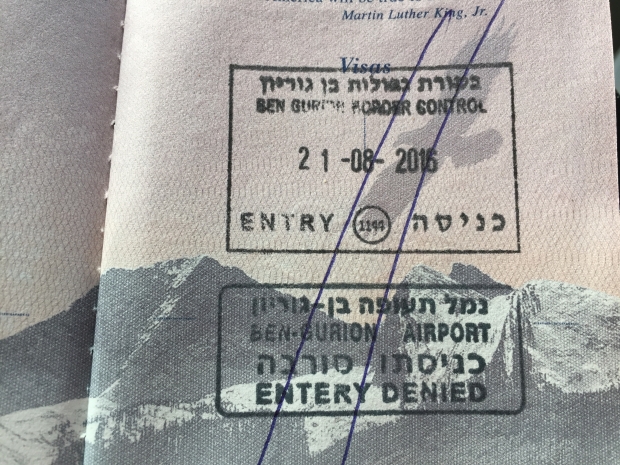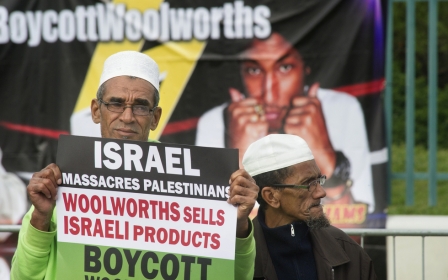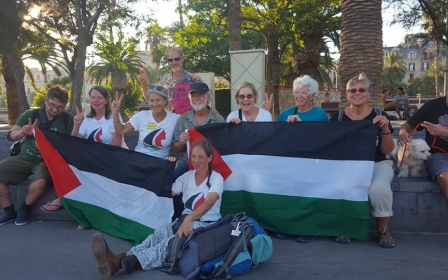Deported: Israel's war against Palestine solidarity activists

NGO Monitor is a right-wing organisation closely connected to the Israeli government, which has published strident attacks on groups such as Jewish Voice for Peace, Amnesty International, B-Tselem and Breaking the Silence. Recently, it issued what it bills as a fact sheet on “Abuse of Tourist Visas by Radical NGO Activists for BDS and Political Warfare.”
The document opens by stating: “NGO activists have systematically obtained tourist visas to enter Israel under false pretenses, and then acted to harass and obstruct IDF and security personnel, organise and participate in violent protests, contact terror organisations, promote BDS and demonisation, and engage in other activities inconsistent with the status of tourists.”
When I arrived at Ben Gurion Airport with my invitation letter and permit number in hand, I was fingerprinted and photographed
It then proceeds to list several individuals who have been refused entry to Israel in the wake of the announcement by Gilad Erdan, the public security minister, in August of a government task force to “prevent BDS (boycotts, divestments and sanctions) activists from further exploiting tourist visas and deport activists in the country illegally.”
One of those deported individuals listed is me.
However, I did not arrive in Israel seeking a tourist visa that I could exploit. (And by the way, while I unashamedly support the BDS movement, I have never harassed IDF personnel, organised or participated in violent protests, or made contact with “terrorists”.)
Instead, I had received - in advance, from the appropriate Israeli agency - a permit to enter the Gaza Strip, where a Swedish NGO was sending me to help implement a women’s programme. I also am the international secretary for the Euro-Med Human Rights Monitor and director of We Are Not Numbers, both of which focus on Gaza, as noted by NGO Monitor.
Yet when I arrived at Ben Gurion Airport with my invitation letter and permit number in hand, I was fingerprinted and photographed, held in jail for 12 hours, deported back to the United States and informed I could not return for 10 years.
That sounds dramatic - but more-or-less similar scenario has been playing out numerous times since January of this year.
It's not just me who was deported
In 2015, only 1 percent of the 384 “incidents” encountered by UN and international NGO employees and consultants resulted in deportations, according to reports submitted to the Access Coordination Unit (ACU) of the UN Office of the Resident and Humanitarian Coordinator. Instead, the vast majority of problems (76 percent) were delays. The same pattern had been observed during the previous three years.
However, to date in 2016, 8 percent of the 233 incidents reported ended in deportation, while another 18 percent resulted in “cancelled missions”. These numbers are a minimum: they don’t include independent workers, academics and activists who make up the lion’s share of the deportees. No one is collecting any numbers for them - other than, most likely, the Israeli government.
Interviews with several of the 2016 deportees show they are a much more varied and well-intentioned group than NGO Monitor lets on. Here are just a few examples:
Joe Weston of Washington, DC, is an international workshop facilitator and author of the book Mastering Respectful Confrontation. That’s a rather ironic specialty, in light of the fact that he was deported by Israel and given a 10-year ban. Weston also had a permit to enter Gaza and was travelling there to lead several training sessions for the Swedish NGO that had sponsored me. However, when the Israeli border guards asked him for his contacts in Gaza and he said he had none, they replied that they didn’t believe him - and that was that.
Max (who prefers not to have his last name published), comes from the UK. He was on his way to the West Bank to take a job as a writer for a Palestinian news service. He was interrogated repeatedly, first about what he would be doing there. Then they searched his mobile phone for any contacts with local numbers. The conclusion? He was a security risk. “When I heard that I would be banned for 10 years, that was it,” said Max, who had quit his other employer to move to the West Bank. “It killed my spirit. I slept most of the 12 hours I spent in the jail.”
'When I heard that I would be banned for 10 years, that was it. It killed my spirit. I slept most of the 12 hours I spent in the jail'
Max and I were both particularly struck by the fact that when it came time for our flight home, the guards waited until the last minute, then drove us right up to the plane, on the tarmac. We were not even allowed to enter the airport. Max recalled: “I asked about how last-minute it was, and the guards said: ‘This is our airport. The airlines do as we say.'"
In my case, my carrier was United Airlines, and the crew did as instructed by Israeli Border Control: hold my passport until we were close to landing. Why, I asked? Because, I was told, if the plane had to make an unexpected landing, I might try to “escape”.
Lauren Jappe of Boston was travelling to Bethlehem for her local Jewish Voice for Peace chapter to present at a conference on refugees and set up a “sister” relationship with one of the refugee camps in the area. When the border guards discovered, however, that she had previously visited Ramallah, a fact she assumes they learned through an online search, they demanded she allow them to search her mobile phone and email account - with one of them bragging that he was experienced in interrogating “terrorists”.
She refused, was yelled at for having a “bad attitude” - and deported. “I had heard about such things happening, and a friend I was able to text from the airport told me what would be coming,” she recalled. “But still, when I stood waiting with several Eastern European women who didn’t speak English, for the van that would take me to my jail [for what turned out to be 11 hours of detention], that was the worst moment. The uncertainty of how long this would go on.” An odd fact observed by everyone interviewed is that the detention facility seemed to house many Russians, Ukrainians and Georgians who did not appear to be activists.
Israeli minister: BDS is another branch of terrorism
This current wave of deportations is fuelled by public participation, encouraged by government officials. "If you have information about someone who is pretending to be a tourist but is in fact a boycott activist visiting Israel, let us know and we'll act to have him expelled from Israel," Erdan, who also serves as the minister for strategic affairs, wrote on Facebook.
Indicators suggest that the start of 2016 marked the launch of a broad campaign to target and remove or neutralise activists
In addition to Israel’s apparent witch hunt for BDS supporters, NGOs that work with Palestinians - especially those in Gaza - have also come under attack. The Israeli government has accused officials at both World Vision and the UN Development Programme of funneling money to Hamas. In addition, Foreign Policy magazine spoke with a dozen senior employees from NGOs and UN agencies, most of whom were reluctant to talk on the record (a common problem). Three-quarters said it has recently become more difficult to work in Gaza.
In 2015 and early 2016, only about three percent of UN employees were denied permits to enter, the magazine reported. But during the past few months, that number has increased to nearly 30 percent.
Meanwhile, Erdan’s office announced that Israel has agreed with Facebook representatives to create teams to determine how to monitor and remove “inflammatory content” on the social media platform. Proposed legislation seeks to force other networks to remove content that Israel considers to be incitement.
“BDS is another branch of terrorism in the modern age,” declared Israeli Justice Minister Ayelet Shaked, speaking at a Jewish National Fund conference in New York last month.
All indicators suggest that the start of 2016 marked the launch of a broad campaign to target and remove or neutralise activists and other supporters who still have the will to advocate for Palestinians on Israel’s declared turf.
It is, you could say, a war of wills - and a brutal use of power.
This article is available in French on Middle East Eye French edition.
Stay informed with MEE's newsletters
Sign up to get the latest alerts, insights and analysis, starting with Turkey Unpacked
Middle East Eye delivers independent and unrivalled coverage and analysis of the Middle East, North Africa and beyond. To learn more about republishing this content and the associated fees, please fill out this form. More about MEE can be found here.





